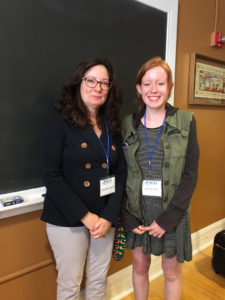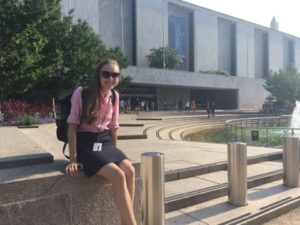Corinne Petro, ethnic studies/philosophy
By Nicolle McMurray
For Corinne Petro, the Philosophy in an Inclusive Key Summer Institute lived up to its promise of being 10 days she wouldn’t forget.

Petro, a philosophy and ethnic studies student with a concentration in women’s studies, attended the prestigious PIKSI Rock program June 21-30 at Penn State University. PIKSI is a summer program designed to encourage under-represented students to consider future study in the field of philosophy. For Petro, her experience at PIKSI did just that.
“At this point, I am an Ethnic Studies major with a concentration in Women’s Studies and a minor in Philosophy,” Petro said. “After this experience, I am going to do a double major in Philosophy.”
Every year, PIKSI focuses on a central theme that the lectures, seminars and workshops revolve around. This summer, PIKSI tackled the issue of social justice and demonstrated that philosophy is not confined to academia. Petro worked one-on-one with a graduate assistant, Lacey Davidson, who is doing work on epistemic injustice in her community.
Epistemic injustice is the philosophical idea that women and members of other minority groups can be wronged by a general failure to take their knowledge claims seriously (testimonial injustice) or by the very lack of social resources to fully comprehend their own experiences (hermeneutical injustice). An example of this injustice may be a woman whose credibility and competency is questioned in a professional setting where she is indeed the expert. The injustice is more than a missed opportunity like a well-deserved promotion, but also a disregard for her experience and knowledge. In addition to the professional harm this injustice may cause, it can also result in a deflated self-perception and a lack of confidence.
This study of feminist epistemology and hermeneutical injustice is Petro’s passion, and through PIKSI she has been able to refine her ideas on the subject, find resources to strengthen her claims, and speak with someone who is doing the work she wants to do.
“I entered PIKSI with no idea of what to expect. Now, I am leaving with a plan for graduate school, a new group of friends, and a broader range of philosophical interests,” said Petro.
Petro is a first-generation student who entered college knowing nothing about graduate school. PIKSI not only instilled a desire in Petro to pursue a graduate degree, she also walked away with a list of Ph.D. and master’s programs she wants to apply to, information about writing a personal statement and selecting writing samples, and connections with faculty and graduate assistants around the country.
“I am starting to feel prepared for my future, and excited about a future in philosophy,” said Petro.
As part of PIKSI’s goal to inspire under-represented students to pursue philosophy, all transportation and lodging is provided and all accepted students receive a stipend, making PIKSI accessible to all interested undergraduate students, regardless of their socioeconomic backgrounds. For more information about the institute, reach out to PIKSI alumna Cori Wong, special assistant to CSU President Tony Frank, director of the Women and Gender Collaborative, and special instructor in the Center for Women’s Studies and Gender Research, at cori.wong@colostate.edu.
Heidi Fuhrman, history
By Nicolle McMurray
Oh, say, does that star-spangled banner yet wave in the hands of this CSU Ram?

Heidi Fuhrman, a history major entering her senior year this fall, has been spending her summer interning at the Smithsonian Institute’s National Museum of American History in Washington, D.C. As a public programs intern, Fuhrman works in the Office of Audience Engagement facilitating various museum education programs (like the history of colonial chocolate-making) and helping with public programming and special events.
On a daily basis, this involves a program called “flag folding,” where museum staff involve visitors in unfolding a full-size replica of the Star Spangled Banner – the famous flag that flew over Fort McHenry during the War of 1812 and inspired Frances Scott Key to write the United States’ national anthem.
“There is something incredible in the moment when the entire two-story lobby is filled with Americans from all different backgrounds and beliefs singing our national anthem,” says Fuhrman. “Everyone is gathered around the massive flag, and you realize that this country is made up of so many stories, and you literally cannot carry the symbol of our nation by yourself.”
Fuhrman credits the history department for preparing her with the skills she needs at the Smithsonian Institute. The department pushes undergraduates to do primary-source research, which has been a crucial part of Fuhrman’s job as she is developing museum programming.
“Overall, I think my degree has taught me a lot about how to look at history from different perspectives, communicate large ideas and concepts to individuals of different ages and backgrounds, and be a ‘good’ historian!” says Fuhrman.
Fuhrman’s love of history stemmed from her childhood. Her parents loved to road trip, and would either take the family to historic sites around the country or listen to historic books in the car. She developed a love of stories and the power they have to change lives, society and nations.
“I love the idea of helping to inspire people by showing them what others before them have done, or spurring them to action by sharing the stories of history, or challenging them to work for change by reminding them of some of the things we’d rather forget,” she says.
After graduation in 2018, Fuhrman will pursue work in public history through graduate school or additional internship experience.